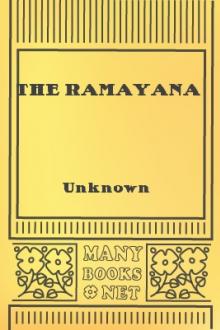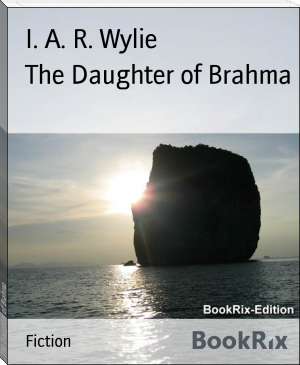The Ramayana - Valmiki (best ereader for epub txt) 📗

- Author: Valmiki
- Performer: -
Book online «The Ramayana - Valmiki (best ereader for epub txt) 📗». Author Valmiki
left">But leave him in his royal state.
As regent heir content thee still,
Submissive to thy father's will.’ ”
Ráma again his charge renewed,
As the hot flood his cheek bedewed:
“Hold as thine own my mother dear
Who drops for me the longing tear.”
Then Lakshmaṇ, with his soul on fire,
Spake breathing fast these words of ire:
“Say, for what sin, for what offence
Was royal Ráma banished thence?
He is the cause, the king: poor slave
To the light charge Kaikeyí gave.
Let right or wrong the motive be,
The author of our woe is he.
Whether the exile were decreed
Through foolish faith or guilty greed,
For promises or empire, still
The king has wrought a grievous ill.
Grant that the Lord of all saw fit
To prompt the deed and sanction it,
In Ráma's life no cause I see
For which the king should bid him flee.
His blinded eyes refused to scan
The guilt and folly of the plan,
And from the weakness of the king
Here and hereafter woe shall spring.
No more my sire: the ties that used
To bind me to the king are loosed.
My brother Ráma, Raghu's son,
To me is lord, friend, sire in one.
The love of men how can he win,
Deserting, by the cruel sin,
Their joy, whose heart is swift to feel
A pleasure in the people's weal?
Shall he whose mandate could expel
The virtuous Ráma, loved so well,
To whom his subjects' fond hearts cling—
Shall he in spite of them be king?”
But Janak's child, my lord, stood by,
And oft the votaress heaved a sigh.
She seemed with dull and wandering sense,
Beneath a spirit's influence.
The noble princess, pained with woe
Which till that hour she ne'er could know,
Tears in her heavy trouble shed,
But not a word to me she said.
She raised her face which grief had dried
And tenderly her husband eyed,
Gazed on him as he turned to go
While tear chased tear in rapid flow.”
Canto LIX. Dasaratha's Lament.
As thus Sumantra, best of peers,
Told his sad tale with many tears,
The monarch cried, “I pray thee, tell
At length again what there befell.”
Sumantra, at the king's behest,
Striving with sobs he scarce repressed,
His trembling voice at last controlled,
And thus his further tidings told:
“Their locks in votive coils they wound,
Their coats of bark upon them bound,
To Gangá's farther shore they went,
Thence to Prayág their steps were bent.
I saw that Lakshmaṇ walked ahead
To guard the path the two should tread.
So far I saw, no more could learn,
Forced by the hero to return.
Retracing slow my homeward course,
Scarce could I move each stubborn horse:
Shedding hot tears of grief he stood
When Ráma turned him to the wood.333
As the two princes parted thence
I raised my hands in reverence,
Mounted my ready car, and bore
The grief that stung me to the core.
With Guha all that day I stayed,
Still by the earnest hope delayed
That Ráma, ere the time should end,
Some message from the wood might send.
Thy realms, great Monarch, mourn the blow,
And sympathize with Ráma's woe.
[pg 165]
Each withering tree hangs low his head,
And shoot, and bud, and flower are dead.
Dried are the floods that wont to fill
The lake, the river, and the rill.
Drear is each grove and garden now,
Dry every blossom on the bough.
Each beast is still, no serpents crawl:
A lethargy of woe on all.
The very wood is silent: crushed
With grief for Ráma, all is hushed.
Fair blossoms from the water born,
Gay garlands that the earth adorn,
And every fruit that gleams like gold,
Have lost the scent that charmed of old.
Empty is every grove I see,
Or birds sit pensive on the tree.
Where'er I look, its beauty o'er,
The pleasance charms not as before.
I drove through fair Ayodhyá's street:
None flew with joy the car to meet.
They saw that Ráma was not there,
And turned them sighing in despair.
The people in the royal way
Wept tears of bitter grief, when they
Beheld me coming, from afar,
No Ráma with me in the car.
From palace roof and turret high
Each woman bent her eager eye;
She looked for Ráma, but in vain;
Gazed on the car and shrieked for pain.
Their long clear eyes with sorrow drowned
They, when this common grief was found,
Looked each on other, friend and foe,
In sympathy of levelling woe:
No shade of difference between
Foe, friend, or neutral, there was seen.
Without a joy, her bosom rent
With grief for Ráma's banishment,
Ayodhyá like the queen appears
Who mourns her son with many tears.”
He ended: and the king, distressed.
With sobbing voice that lord addressed:
“Ah me, by false Kaikeyí led,
Of evil race, to evil bred,
I took no counsel of the sage,
Nor sought advice from skill and age,
I asked no lord his aid to lend,
I called no citizen or friend.
Rash was my deed, bereft of sense
Slave to a woman's influence.
Surely, my lord, a woe so great
Falls on us by the will of Fate;
It lays the house of Raghu low,
For Destiny will have it so.
I pray thee, if I e'er have done
An act to please thee, yea, but one,
Fly, fly, and Ráma homeward lead:
My life, departing, counsels speed.
Fly, ere the power to bid I lack,
Fly to the wood: bring Ráma back.
I cannot live for even one
Short hour bereaved of my son.
But ah, the prince, whose arms are strong,
Has journeyed far: the way is long:
Me, me upon the chariot place,
And let me look on Ráma's face.
Ah me, my son, mine eldest-born,
Where roams he in the wood forlorn,
The wielder of the mighty bow,
Whose shoulders like the lion's show?
O, ere the light of life be dim,
Take me to Sítá and to him.
O Ráma, Lakshmaṇ, and O thou
Dear Sítá, constant to thy vow,
Beloved ones, you cannot know
That I am dying of my woe.”
The king to bitter grief a prey,
That drove each wandering sense away,
Sunk in affliction's sea, too wide
To traverse, in his anguish cried:
“Hard, hard to pass, my Queen, this sea
Of sorrow raging over me:
No Ráma near to soothe mine eye,
Plunged in its lowest deeps I lie.
Sorrow for Ráma swells the tide,
And Sítá's absence makes it wide:
My tears its foamy flood distain,
Made billowy by my sighs of pain:
My cries its roar, the arms I throw
About me are the fish below,
Kaikeyí is the fire that feeds
Beneath: my hair the tangled weeds:
Its source the tears for Ráma shed:
The hump-back's words its monsters dread:
The boon I gave the wretch its shore,
Till Ráma's banishment be o'er.334
Ah me, that I should long to set
My eager eyes to-day
On Raghu's son, and he be yet
With Lakshmaṇ far away!”
Thus he of lofty glory wailed,
And sank upon the bed.
Beneath the woe his spirit failed,
And all his senses fled.
Canto LX. Kausalyá Consoled.
As Queen Kauśalyá, trembling much,
As blighted by a goblin's touch,
Still lying prostrate, half awoke
To consciousness, 'twas thus she spoke:
“Bear me away, Sumantra, far,
Where Ráma, Sítá, Lakshmaṇ are.
Free e-book «The Ramayana - Valmiki (best ereader for epub txt) 📗» - read online now
Similar e-books:





Comments (0)